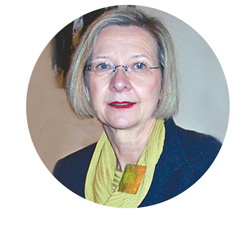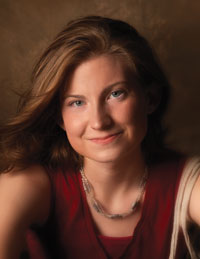Phenomenal Pitt Women
Pitt Magazine, in its Winter 2009 issue, highlighted the successes and contributions of 12 University of Pittsburgh women. In honor of the nationally celebrated Women’s History Month in March, the magazine’s editors and publisher assembled a contemporary cross-section of women from the Pittsburgh campus, representing students, faculty, staff, alumni, and trustees. The editors wrote profiles of these 12 “Phenomenal Women” and the Pitt Chronicle is reprinting them as a series in the March 16, 23, and 30 issues.
 Angela M. Gronenborn, UPMC Rosalind Franklin Professor and Chair Department of Structural Biology, School of Medicine, University of Pittsburgh Member, National Academy of Sciences Fellow, American Association for the Advancement of Science
Angela M. Gronenborn, UPMC Rosalind Franklin Professor and Chair Department of Structural Biology, School of Medicine, University of Pittsburgh Member, National Academy of Sciences Fellow, American Association for the Advancement of ScienceGerman-born Angela Gronenborn loves to walk. For her, walking is a way to stimulate thinking and stay fit. As a graduate student at the University of Cologne, she walked the city. As a postdoctoral fellow and scientist in London, she walked to her research lab in Mill Hill. She enjoyed hiking the Alps and exploring Munich in her time at the Max Planck Institute. And she combined Metro rides with urban strolls during her years as chief of structural biology at the National Institutes of Health (NIH) near Washington, D.C.
As a leading structural biologist and expert in nuclear magnetic resonance (NMR) spectroscopy, Gronenborn has a lot to think about. In her work, she uses massive magnets to decipher the structure of proteins and other biomolecules at the atomic level. Today, Gronenborn is the UPMC Rosalind Franklin Professor and Chair in the Pitt School of Medicine’s Department of Structural Biology.
“If you want to know how proteins interact with one another, you need to know their shapes and the location of their binding sites,” she says. This knowledge aids in understanding cellular processes and suggests structure-based avenues for drug development and treatment approaches. While at NIH, Gronenborn detected a way to inhibit the AIDS virus. Using magnetic fields, she unmasked the structure of a particular protein that binds to certain sugars on the virus, blocking the virus from infecting human cells. This led to a new strategy for inactivating HIV. Her group also pioneered three- and four-dimensional NMR methods that reveal enormous structural detail. Gronenborn—who was elected a member of the elite National Academy of Sciences in 2007 and a fellow of the prestigious American Association for the Advancement of Science in 2003—continues to decipher proteins, looking for other potential pathways to prevent and treat diseases.
Wherever she goes, she pursues life with European flair. Research, she says, requires as many adventurous minds as possible.
 Yuan Chang, Professor of Pathology Department of Pathology, School of Medicine, University of Pittsburgh Cowinner, 2003 Charles S. Mott Prize
Yuan Chang, Professor of Pathology Department of Pathology, School of Medicine, University of Pittsburgh Cowinner, 2003 Charles S. Mott PrizeProfessor Yuan Chang lives in a hilly, wooded section of Pittsburgh, not far from campus. Although the surroundings are urban, her family’s yard gets visits from deer, raccoons, and even wild turkeys. She shares this setting with her scientist husband, Patrick Moore, and the two “collaborate” to bring up their son, Jackson. They also work together in a University lab, looking for viruses that cause cancers. “To develop effective therapies and to gain a basic understanding of cancer, we need to know why some viruses evolve to cause cancers while others cause nothing worse than the common cold,” says Chang, a neuropathologist.
Many scientists have searched for such links, with few outright successes. Only seven viruses are known to cause human cancers—and two of them were found by Chang and Moore, who is a Pitt professor of microbiology and molecular genetics. In 2003, they shared the prestigious Charles S. Mott Prize for pegging KSHV, a herpes virus, as the cause of Kaposi’s sarcoma, the leading AIDS malignancy. In 2008, the Chang-Moore lab discovered that Merkel cell polyomavirus causes an aggressive skin cancer.
Chang is one of only a few scientists, and the lone woman, to have such phenomenal success in the virus-cancer field. One reason is that she and Moore developed a technique called digital transcript subtraction (DTS), which allows them to cross-compare tumor versus healthy gene sequences in the national Human Genome Project database. With DTS, they can quickly eliminate healthy genetic strands from errant strands. On very good days, they may even be able to match an errant strand with a known virus strand, a telltale breakthrough.
Chang serves on editorial boards and has received numerous awards, including the Meyenburg Foundation Award for Cancer Research, the Robert Koch Prize, and the New York Academy of Sciences’ Mayor’s Award for Excellence in Science and Technology.
Although Chang is passionate about searching for the links between viruses and cancers, she also loves the broader wonders in her life—home, garden, family, and a yard full of wildlife.
 Eleanor Ott, Class of ’09 2008 Truman Scholar Senior, School of Arts and Sciences and Honors College University of Pittsburgh
Eleanor Ott, Class of ’09 2008 Truman Scholar Senior, School of Arts and Sciences and Honors College University of PittsburghBetween classes, Pitt senior Eleanor Ott walks to a nearby high school every week to tutor refugees who’ve come to the United States seeking better lives. Patiently, she repeats English words and rules of grammar, helping students to learn the tongue of their new country.
As president of the student organization FORGEPitt, she also leads other Pitt students in tutoring refugees. Ott was one of the first members of Pitt’s chapter of Facilitating Opportunities for Refugee Growth and Empowerment, a national refugee advocacy organization. Through the group, Ott—a triple major in chemistry, history, and French—also has spent summers working at a refugee camp in Zambia.
Ott’s academic accomplishments, community service, and leadership won her a Harry S. Truman Scholarship, a highly competitive, merit-based federal award named after President Harry S. Truman. She was one of only 65 students nationwide to receive the honor in 2008. The award provides support for the nation’s top undergraduates to attend graduate school in preparation for public service careers.
After graduate school, Ott aspires to be a United Nations protection officer in a refugee camp—a job that will allow her to use both her intellect and her compassion.
“I’ve talked with refugees who feel like the world has turned its back on them,” says Ott. “I try to give them hope and help them improve their lives. Change can only happen with resources and the belief that it is possible. It is my life’s passion to see that through.”
Other Stories From This Issue
On the Freedom Road

Follow a group of Pitt students on the Returning to the Roots of Civil Rights bus tour, a nine-day, 2,300-mile journey crisscrossing five states.
Day 1: The Awakening
Day 2: Deep Impressions
Day 3: Music, Montgomery, and More
Day 4: Looking Back, Looking Forward
Day 5: Learning to Remember
Day 6: The Mountaintop
Day 7: Slavery and Beyond
Day 8: Lessons to Bring Home
Day 9: Final Lessons

